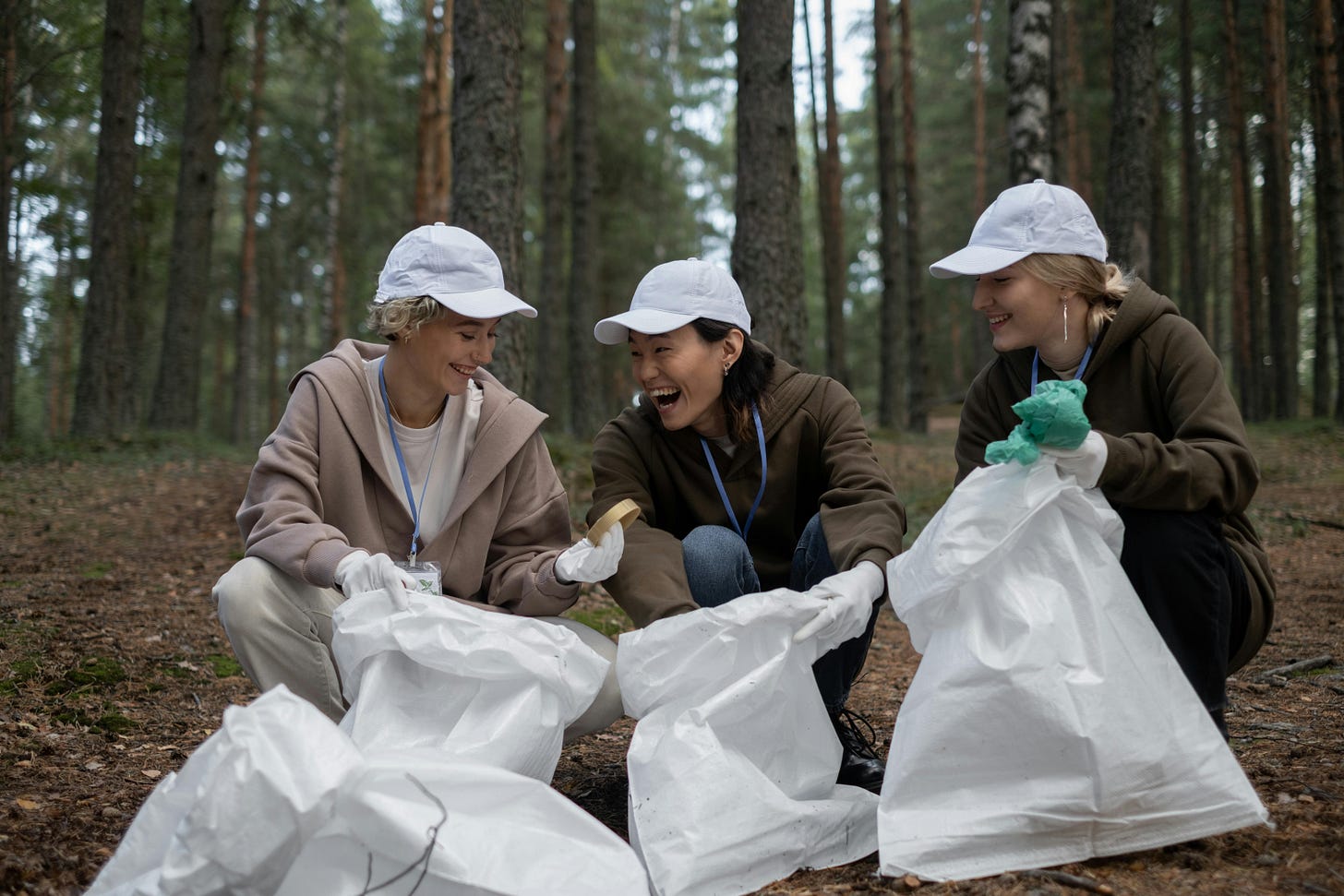Evaluating Volunteer Programs with an Eye on Equity, Accessibility, and Effectiveness
Welcome to Insights & Opportunities: A Hub for Informal STEM Education! Insights & Opportunities is a twice-monthly newsletter for educators, administrators, legislators, and advocates who recognize the importance of informal STEM learning.
This newsletter is brought to you by me, Sarah Dunifon, and my team at Improved Insights. I’m a long-time STEM educator, researcher, and equity advocate. Along with my team, I now work on cutting-edge informal STEM learning research and evaluation.
Each edition of this newsletter offers exciting insights, resources, and opportunities for informal STEM learning professionals, including funding, jobs, professional development, informal STEM learning research, evaluation tips and resources, and so much more! We hope you find it valuable. Now, let’s get started.
Evaluating Volunteer Programs with an Eye on Equity, Accessibility, and Effectiveness
In this post, we’ll explore “The Next Era of Volunteerism” by Elizabeth Merritt, an article from TrendsWatch, an annual report produced by the American Alliance of Museums, and approach it from the lens of evaluation. While Merritt’s work focuses on museums specifically, the insights are relatable to anyone working with volunteers.
In the article, Merritt contends that volunteering in U.S. museums is at a pivotal time when hard decisions are being made about the future of the practice. Influences like artificial intelligence, conversations about paid and unpaid labor practices, shifting economic and demographic trends that influence who is able to spend time volunteering, and attention to equity and accessibility all press on the historic legacy of volunteering, perhaps forcing it to turn into something new.
Volunteering has a storied legacy in the U.S., particularly in nonprofit and museum spaces. Merritt (2025) notes how volunteering benefits institutions that perhaps cannot afford to hire paid staff as well as the many benefits for volunteers themselves, which include “improved mental and physical health, a sense of purpose, enhanced life satisfaction and self-esteem, and wider social connections” (p. 14).
Since the wide adoption of volunteer management in the museums field in the 1990s, volunteer programs have largely focused on the outputs of the role (e.g., envelopes stuffed, hours logged, tours given). More recently, organizations are questioning the “who, how, and why of volunteerism,” according to Merritt (p.13). Here we might ask “Who are our volunteers?” “How do they engage in our work?” and “Why do they choose to volunteer?”
To read the full article, check it out in our Insights.
60-Second Suggestions
Here are a few of my favorite things this month, usually pertaining to informal STEM education and evaluation, but occasionally some fun personal stuff, too.
April is Global Volunteer Month. Community-Centric Fundraising has highlighted this essay by Jessica Pang-Parks, an advocate for volunteerism and volunteer engagement. Pang-Parks reflects on her experience in the field with nonprofits and volunteer management. She observes that most nonprofit organizations tend to devalue volunteer engagement in favor of donor engagement and advocates for more investment in volunteer engagement professionals and a prioritization of their voices in strategic planning efforts to address this disparity.
This article from the Observer discusses an emerging trend in current museum research that examines how these cultural centers impact the well-being of their audiences. The article spotlights two studies currently being conducted by The American Alliance of Museums and The High Museum of Art in Atlanta, Georgia, that both aim to measure different complex constructs of well-being outcomes for visitors, including physical health, emotional, social, and spiritual effects.
The North American Association for Environmental Education (NAAEE), ee360+, and Cedar Tree Foundation have launched the 2025 Civics and Environmental Education (CEE) Change Fellowship to scale their impact working toward a more sustainable future. During the 12-month fellowship, fellows will strengthen their communities through a community-based environmental education action project. The fellowship will provide opportunities for leadership training, technical assistance, professional development, and access to a growing network of community leaders. Applications are open through April 23, 2025.
Opportunities
Check out these new opportunities for the informal STEM learning community.
Funding:
2025 HHF Program Grant, Hulsebosch Hope Foundation (HHF), $10,000-$20,000. Mid-sized, growth-oriented public charities in the city of Chicago are invited to apply for program funding that supports quality education and the care and support of children, among other core areas. Programs should serve under-resourced communities, particularly in the south and west sides of the city, and align with focus areas including afterschool programs, entrepreneurship support, workforce training, and financial literacy programs, among others. Applications are due May 7, 2025.
APS Innovation Fund, American Physical Society (APS), $50,000. APS members based in the U.S. are invited to apply for funding to expand programs that enhance access, deepen knowledge, and increase opportunities in physics-based climate science education and career pathways. Submitted projects may scale existing programs to reach more audiences, expand successful initiatives across the physics community, and/or implement innovative initiatives aimed at enhancing public awareness of climate science physics. Applications are due May 2, 2025.
Research Grants on Reducing Inequality, William T. Grant Foundation, up to $600,000. Grants of up to $600,000 will be awarded to support research that builds, tests, or increases understanding of programs and practices that reduce inequality in academic, social, behavioral and economic outcomes of those ages 5-25. Specific research interests include how various youth-serving programs (including out of school time education) affect long-term outcomes for students. Applications are due May 7, 2025.
STEM Stars Grant Program, Glenn W. Bailey Foundation, up to $25,000. Funding is available to organizations that support middle and high school students in advanced STEM programs (both in and out of school) and who ultimately want to pursue a college degree in a STEM-related field. Various STEM interest areas are supported by the grants, including Enrichment Activities, Assessment and Evaluation, and Parent and Community Engagement. Applications are considered on a rolling basis.
Student STEM Enrichment Program (SSEP), Burroughs Wellcome Fund, up to $60,000. Nonprofit organizations, including public and private schools, colleges and universities, and community groups in North Carolina are invited to apply for grants in support of diverse programs that enable K-12 students to participate in creative, hands-on STEM activities. Programs must employ inquiry-based avenues of exploration. Applications are due June 9, 2025.
Jobs and Fellowships:
Assistant Director of Youth Programs, Ketcha Outdoors (Scarborough, ME), $47,000. The Assistant Director of Youth Programs will coordinate and administer after school program offerings, assist with summer camp preparations and implementation, and manage related daily operations. They will lead communication with families, maintain licensing compliance, coordinate staffing schedules, and support program evaluation efforts.
CEO, Discovery Lab (Tulsa, OK), $150,000. The CEO will serve as the primary leader and visionary for Discovery Lab, ensuring growth, sustainability, and continued success. They will oversee strategic planning, fundraising, financial management, community engagement, program and exhibit development, and staff mentoring and training, ensuring operational excellence across all programs, facilities, and services.
Director of Audience and Impact, Space Center Houston (Houston, TX), $100,000. The Director of Audience and Impact will be responsible for strategic oversight of audience research and evaluation projects at Space Center Houston. Additionally, they will participate in strategic planning and project prioritization to maximize audience engagement and organizational impact.
Director of Programming, Muddy Sneakers (Raleigh, NC), $60,000. The Director of Programming will oversee all elements of Muddy Sneakers programming, including strategic oversight, budget management, program growth, operations and evaluations, partnerships, and supervision of a multi-region management team.
Executive Director, Maine Mineral & Gem Museum (Bethel, ME), $85,000. The Executive Director will provide leadership, vision, and long-term planning, while overseeing fundraising, community, media, and political relations. They will collaborate with the Board of Trustees to develop strategic priorities for the organization, oversee operations including programming and educational initiatives, and oversee Museum communications efforts.
Leader, Project FeederWatch, Cornell University Lab of Ornithology (Ithaca, NY), $75,000. Project FeederWatch, a research and education project involving more than 30,000 participatory scientists annually, is seeking a Project Leader. The Project Leader will manage all aspects of project delivery, including pursuit and implementation of external funding, project development and management, public outreach and science communication, and scientific research. Review of applications will begin May 5, 2025.
Professional Development:
2025 AAM Annual Meeting & MuseumExpo, American Alliance of Museums (AAM), May 6-9, 2025 (Los Angeles, CA). The 2025 AAM Annual Meeting & MusemExpo will be held in Los Angeles, CA, May 6-9, 2025. The event will bring together 5,000+ attendees from museums of all types and sizes to focus on the theme of Museums & Trust. Advanced rates are available through May 5, 2025.
2025 Summer Institute for Climate Change Education, Teach Climate Network, July 14-17, 2025 (Virtual). The Summer Institute for Climate Change Education invites both formal and informal educators to join for a three-day climate change education conference July 14-17, 2025. The Institute will explore the themes of: Understanding and Observing Climate Change, Education for Justice, Educators as Change Makers & Champions, and Climate Change Education Policy, among others.
NAAEE 2025: Forward Together, North American Association for Environmental Education (NAAEE), November 3-6, 2025 (virtual). NAAEE is seeking presentation proposals for their 54th annual conference. The conference will be held virtually this year, November 3-6, 2025, and NAAEE is inviting proposals from around the world that speak to the overall theme, “Forward Together.” Proposal submissions are due May 16, 2025.
Thanks for tuning in to this edition of Insights and Opportunities. While you’re waiting for the next edition, tell your friends! We appreciate you sending along a blog post you enjoyed, a job opportunity you think a friend should apply for, and resources you found valuable. Sharing this newsletter is the best way to support this work. Until next time - thanks!










